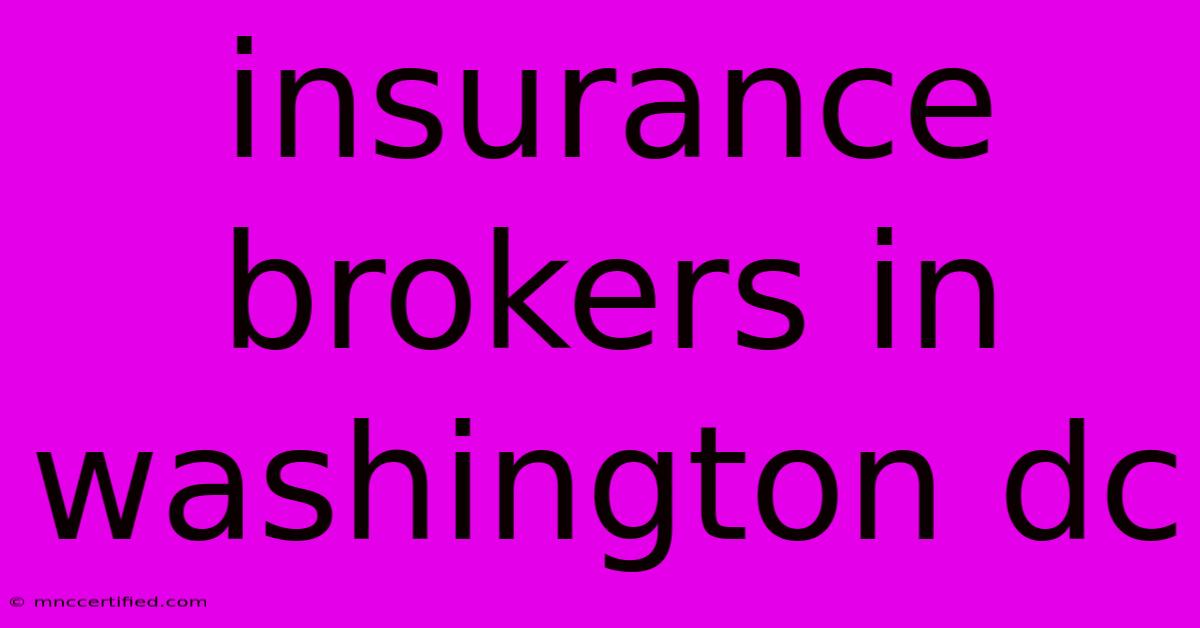Insurance Brokers In Washington Dc

Table of Contents
Finding the Right Insurance Broker in Washington, DC: A Comprehensive Guide
Finding the right insurance broker in Washington, DC can feel overwhelming. With so many options available, how do you choose the best fit for your needs? This comprehensive guide will help you navigate the landscape of insurance brokers in Washington DC, ensuring you find a trusted partner to protect your assets and future.
Understanding the Role of an Insurance Broker in Washington DC
Unlike insurance agents who represent a single insurance company, insurance brokers in Washington DC work independently. This means they can compare policies from multiple insurers, finding you the best coverage at the most competitive price. Their expertise extends beyond simply finding a policy; they act as your advocate, guiding you through the complexities of insurance and ensuring you understand your coverage. This is especially crucial in a city like Washington, DC, with its unique insurance needs.
Key Benefits of Using a DC Insurance Broker:
- Access to Multiple Insurers: Brokers have access to a wider range of insurers, allowing them to tailor a policy to your specific requirements.
- Objective Advice: Unlike agents, brokers aren't tied to a single company, providing unbiased recommendations.
- Personalized Service: Brokers take the time to understand your individual needs and risk profile.
- Claims Assistance: A good broker will assist you with filing claims and navigating the process.
- Expertise in DC Regulations: Navigating the insurance landscape in Washington, DC requires specific knowledge of local regulations and laws; brokers possess this expertise.
Choosing the Right Insurance Broker in Washington, DC: Key Considerations
Selecting the right Washington DC insurance broker requires careful consideration. Here's a checklist to guide your decision:
1. Define Your Insurance Needs:
Before you start your search, identify your insurance needs. Are you looking for:
- Homeowners insurance? Consider the specific risks associated with your property in DC.
- Renters insurance? Protect your belongings and liability.
- Auto insurance? DC has its own unique regulations regarding auto insurance.
- Business insurance? The needs of your business will determine the type of coverage you require.
- Umbrella insurance? This provides additional liability coverage beyond your existing policies.
- Life insurance? Secure your family's financial future.
2. Check Credentials and Licensing:
Ensure your chosen broker is properly licensed by the District of Columbia Department of Insurance, Securities and Banking (DISB). Verify their license online to avoid scams.
3. Read Reviews and Testimonials:
Online reviews offer valuable insights into a broker's reputation and client experiences. Look for consistent positive feedback.
4. Compare Quotes and Coverage:
Don't just focus on price; compare the coverage offered by different brokers. A slightly higher premium might offer significantly better protection.
5. Consider Their Communication and Responsiveness:
Choose a broker who is responsive to your inquiries and communicates clearly and effectively.
Finding Insurance Brokers in Washington, DC: Resources
Finding reputable insurance brokers in Washington, DC can be done through several channels:
- Online Directories: Use online search engines and directories to find local brokers.
- Professional Referrals: Ask for recommendations from friends, family, or colleagues.
- Industry Associations: Check with industry associations like the National Association of Insurance Brokers (NIBA).
Conclusion: Protecting Your Future with the Right Broker
Choosing the right insurance broker is a crucial step in protecting your assets and ensuring your financial security. By following the tips outlined in this guide, you can confidently navigate the process and find a trusted partner to help you manage your insurance needs in Washington, DC. Remember to prioritize thorough research, compare quotes, and choose a broker you feel comfortable with and who understands your unique circumstances. Don't hesitate to ask questions and clarify any uncertainties before making your final decision. This proactive approach will help you secure the best possible insurance coverage for your individual needs.

Thank you for visiting our website wich cover about Insurance Brokers In Washington Dc. We hope the information provided has been useful to you. Feel free to contact us if you have any questions or need further assistance. See you next time and dont miss to bookmark.
Featured Posts
-
Travel Insurance For South America
Nov 16, 2024
-
What Is Blanket Coverage Insurance
Nov 16, 2024
-
Cobra Kai Season 6 Episode Drop Schedule
Nov 16, 2024
-
Louis A Williams Insurance Payment
Nov 16, 2024
-
Cerec Crown Cost Without Insurance
Nov 16, 2024